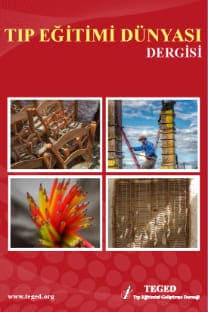Covid-19 Pandemi Yönetimi Uzaktan Eğitim Programının Etkililiği
Tıp, Uzaktan Eğitim, COVID-19, Program, Değerlendirme
Effectiveness Of Covid-19 Pandemic Management Distance Education Program
___
- 1. Dong E, Du H and Gardner L . An interactive web-based dashboard to track COVID-19 in real time. The Lancet infectious diseases. Available at: https://doi.org/10.1016/S1473-3099 2020; (20)30120-1.
- 2. CSSE 2020. COVID-19 Dashboard by the Center for Systems Science and Engineering (CSSE) at Johns Hopkins University (JHU). Available at: https://coronavirus.jhu.edu/map.html.
- 3. Miller DG, Pierson L and Doernberg S. The Role of Medical Students During the COVID-19 Pandemic. Ann Intern Med. 2020. Available at: https://doi.org/10.7326/M20-1281
- 4. General Medical Council. Joint statement: earlyprovisional registration for final year medical students. Available at: https://www.gmc-uk.org/news/news-archive/early-provisional-registration-for-final-year-medical-students. 2020.
- 5. Arandjelovic A, Arandjelovic K, Dwyer K and Shaw C. COVID-19: Considerations For Medical Education During A Pandemic.MedEdPublish. 2020. https://doi.org/10.15694/mep.2020.000087.1
- 6. Menon A, Klein Ej, Kollars K, Kleinhenz A. Medical Students Are Not Essential Workers: Examining Institutional Responsibility During The Covıd-19 Pandemic. Academic Medicine. 2020; 1-9. 10.1097/Acm.0000000000003478
- 7. Alsafi Z, Abbas AR, Hassan A, Ali MA. The Coronavirus (COVID-19) Pandemic: Adaptations in Medical Education. International Journal of Surgery 2020; 78 (2020) 64–65. Https://Doi.Org/10.1016/J.İjsu.2020.03.083
- 8. Republic of XXX Ministry of Health Public Health Divison. COVID-19 (SARS-CoV-2 Infectıon) Guideline. 2020; 11. Updated at: April 14, 2020. Available at: https://covid19bilgi.saglik.gov.tr/depo/rehberler/COVID-19_Rehberi.pdf.
- 9. World Health Organization. WHO Director-General's opening remarks at the media briefing on COVID-19 – March 11, 2020. Geneva, Switzerland. Available at: https://www.who.int/dg/speeches/detail/who-director-general-s-opening-remarks-at-the-media-briefing-on-covid-19---11-march-2020.
- 10. Council of Higher Education. 2020. Available at: https://www.turkiye.gov.tr/yok-ebys.
- 11. TEPDAD (2020) COVID 19 Salgını döneminde Tıp Eğitimi ile İlgili TEPDAD Önerileri 20 Mart 2020. Available at: http://tepdad.org.tr/announcement/4.
- 12. Aker S, Mıdık Ö. The Views of Medical Faculty Students in Turkey Concerning the COVID-19 Pandemic. Journal of Community Health. 2020. https://doi.org/10.1007/s10900-020-00841-9
- 13. Taha MT. Abdalla ME Wadi M and Khalafalla H. Curriculum Delivery ın Medical Education During An Emergency: A Guide on The Responses to The Covıd-19 Pandemic. MedEdPublish. 2020. DOI: 10.15694/mep.2020.000069.1.
- 14. Baig M, Gazzaz ZJ, Farooq M . Blended Learning: The impact of blackboard formative assessment on the final marks and students’ perception of its effectiveness. Pakistan Journal of Medical Sciences Online 2020; 36(3). DOI: 10.12669/pjms.36.3.1925. [Accesed 10 May 2020].
- 15. Kwon K, Park SJ, Shin S and Chang CY. Effects of different types of instructor comments in online discussions’. Distance Education. Taylor&Francis. 2018; 40(2): 226-242.
- 16. Philipsen B, Tondeur J, Roblin NP, Vanslambrouck S and Zhu C. Improving teacher Professional development for online and blended learning: A systematic meta-aggregative review. Educational Technology Research and Development. Springer. 2019; 67(5): 1145-1174.
- 17. Ellaway R, Masters K. AMEE Guide 32: E- Learning in Medical Education. Part 1: Learning teaching and assesment. Medical Teacher. 2008; 30(5): 455-473.
- 18. Kern DE, Thomas PA, Hughes MT. Curriculum Development for Medical Education. A Six-Step Approach. 2nd Edition. John Hopkins University Press, Baltimore, 2009
- 19. Smidt A, Balandin S, Sigafoos J, Reed VA. The Kirkpatrick model: A useful tool for evaluating training outcomes. Journal of Intellectual & Developmental Disability. 2009; 34(3):266–27
- 20. Creswell, JW. Research Design. Qualitative, Quantitative, And Mixed Methods Approaches. London: Sage Publications, 2003 21. Pei L, Wu H. Does online learning work better than offline learning in undergraduate medical education? A systematic review and meta-analysis. Medical Education Online. 2019; 24, 1666538: 1-14. https://doi.org/10.1080/10872981.2019.1666538
- 22. Sandars J. Correia R, Dankbaar M, de Jong P, Goh PS, Hegel I, Masters K, Oh SY , Patel R, Premkumar K, Webb A, Pusic M. Twelve tips for rapidly migrating to online learning during the COVID-19 pandemic. MedEdPublish. 2020. DOI: https://doi.org/10.15694/mep.2020.000082.1
- 23. Singhal S, Hough J, Cripps D. Twelve tips for incorporating gamification into medical education. MedEdPublish. MedEdPublish. 2020. DOI: https://doi.org/10.15694/mep.2019.000216.1
- 24. Deng A, Wang JJ, Tsui CH. Keeping Trainees Safe in A Pandemic: The Evolving Role of Medical Simulation Training. J Can Anesth. 2020. https://Doi.Org/10.1007/S12630-020-01662-Z
- ISSN: 1303-328X
- Yayın Aralığı: 3
- Başlangıç: 2000
- Yayıncı: Tıp Eğitimini Geliştirme Derneği
Tıp Fakültesi Öğrencilerinin Probleme Dayalı Öğrenmeye İlişkin Görüş ve Tutumları
Hülya AYBEK, Hülya ÇERMİK, Mustafa Kemal ALİMOĞLU
Ayhan ÖZHASENEKLER, Basri Furkan DAĞCIOĞLU, Didem ŞENER, Ahmet Çevik TUFAN, Reyhan ERSOY
Covid-19 Pandemi Yönetimi Uzaktan Eğitim Programının Etkililiği
Özlem MIDIK, Özlem TERZİ, Hatice Nilden ARSLAN, Fatih TEMOÇİN, Servet AKER, Yeliz TANRIVERDİ, Aytül KARABEKİROĞLU, Fatih ÇALIŞKAN, Cihad DÜNDAR, A.tevfik SÜNTER, Sancar BARIŞ, S. Sırrı BİLGE, Levent GÜNGÖR, Okan CAN, Ayşenur BAYRAM, Fatma BAYRAMBAŞ
Yolun Başı: Bir Tıp Fakültesi Özelinde Mesleklerarası Eğitime İlişkin Öğretim Üyelerinin Görüşleri
Mukadder İnci BAŞER KOLCU, Özlem Sürel KARABİLGİN ÖZTÜRKÇÜ
Tıp Fakültesi Öğrencilerinin Hekimlik Değer Algıları
Zeynep BAYKAN, Hasan GÜNEŞ, Yasemin SEYFELİ
Tıp Fakültesi Öğrencilerinin Sanal Zorba ve Sanal Kurban Olma Durumlarının İncelenmesi
Ayşen Melek AYTUĞ KOŞAN, Canan AKMAN, Çetin TORAMAN
Covid-19 Pandemi Döneminde Öğretim Üyesi Olmak
Selcen ONCU, Ilgaz AKDOĞAN, Özgür GÜVEN, Hayriye Dilek AKDOGAN, Ayşe TOSUN
